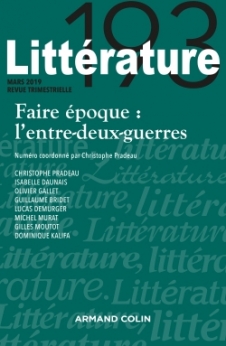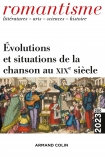
Littérature nº193 (1/2019)
Pour acheter ce numéro, contactez-nous
Recevez les numéros de l'année en cours et accédez à l'intégralité des articles en ligne.
Au début des années 1960, Adorno écrit un bref article sur « Les fameuses Années Vingt » (selon l’expression, et la graphie fixant les majuscules, que donne à lire la traduction française). Du moins est-ce là ce que suggère immédiatement la promotion du chrononyme au rang de titre. On voudrait justement tenter de montrer que l’évidence ne vaut ici que parce qu’elle est truquée. En s’autorisant d’ailleurs de ce qu’Adorno exigeait d’un « bon titre », on verra dans l’affichage du chrononyme le moyen même de chiffrer le propos dont le contenu semble pourtant annoncé en toutes lettres. Ren-versant la fonction unifiante afférant à quelque « nom propre de temps », ce texte, de manière d’autant plus affûtée qu’il semble modestement de cir-constance, dirait bien plutôt, non seulement la discordance des temps mais, depuis une césure irrémédiable, la désappropriation du temps.
At the beginning of the 1960s Adorno writes a short article about “Les fameuses Années Vingt” (according to the expression-and the written form fixing the capital letters-which the French translation proposes to reading). At least therein lies what is immediately suggested by the promotion of the chrononym to the rank of a title. We would precisely try to show that the evidence is worth here merely in so far as it is fake. Moreover grounding our authority in what Adorno used to require from a “good title”, we will consider the promotion of the chrononym as the very means of ciphering the matter the content of which seems however written out in full. Overthrowing the unifying function pertaining to some “proper noun of time” this text, in a way all the more honed as it seems modestly occasional, would rather tell of, not only the discordances of times, but from an irreparable caesura, of the disappropriation off time.

